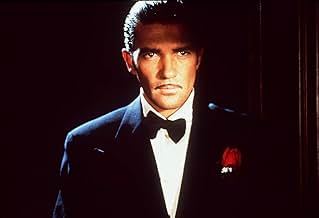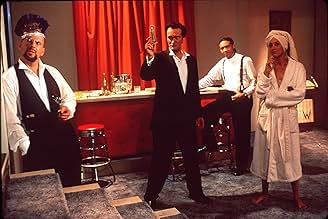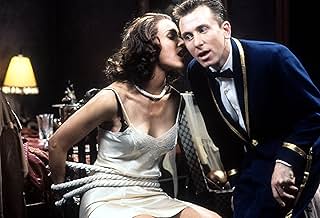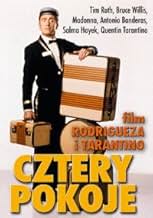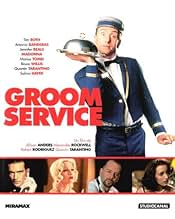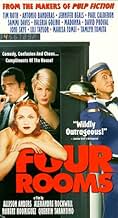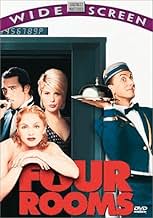Quattro storie intrecciate che si svolgono in un vecchio albergo alla vigilia di Capodanno.Quattro storie intrecciate che si svolgono in un vecchio albergo alla vigilia di Capodanno.Quattro storie intrecciate che si svolgono in un vecchio albergo alla vigilia di Capodanno.
- Premi
- 1 vittoria e 1 candidatura in totale
Amanda De Cadenet
- Diana (segment "The Missing Ingredient")
- (as Amanda deCadenet)
Patricia Vonne
- Corpse (segment "The Misbehavers")
- (as Patricia Vonne Rodriguez)
Recensioni in evidenza
"Four Rooms" is far more entertaining than you would expect from its generally negative reviews. Which is not to say that any of it is a masterpiece but if you enjoyed "Love American Style" on television and are not put off by a raunchy take on that anthology concept you should make an effort to view this film. Each story is taking place in a different room of a hotel the same night. It was made between the time Tarantino made "Pulp Fiction" and worked on "Dusk Till Dawn" with Rodriquez. Many in the large cast are Tarantino and Rodriquez regulars. Here are a few of the reasons to watch each of the four stories:
"The Missing Ingredient" - Madona has simply never looked better and her "come get me" dress will burn your eyeballs. Alicia Witt plays her stock alienated teen and delivers sarcasm as only she can.
"The Wrong Man" – Alexander Rockwell directed this segment shortly after directing "In the Soup" so he already knew how to get the most out of Jennifer Beals. Her diatribe about Ted's sex organ is a cinema classic.
"The Misbehavers" – Rodriquez directs his favorite actor Antonio Banderas in something that is a throwback to classic Laurel and Hardy. Not only do his two kids misbehave when left alone in their hotel room, but their misbehavior is so comprehensive that the closing shot reveals a room of total anarchy. It is wonderful slapstick on a huge scale, with comic timing worthy of the Laural and Hardy and the Marx Brothers.
"The Man From Hollywood" – This has the best script with Tarantino reserving the best stuff for his own character. He even reprises the "tasty beverage" line from "Pulp Fiction. Beals has already found her way to this room by the time bellboy Roth arrives and she delivers more good lines. I was impressed that Tarantino built up his suspense "before" the contest began and then did not try to extend the suspense but ended things on the first attempt.
The best bit in the whole film might be Roth's phone call to his boss. Marisa Tomei answers the phone in a room full of comatose post-New Years Eve partygoers. She then does a version of her "My Cousin Vinnie" expert witness routine, this time concerning types of handguns. In the foreground the entire time are the only other conscious (but totally stoned) inhabitants of the room. They are playing against each other in a video game. One just stares in stunned fascination at the screen, holding the controller but not using it as the other player maniacally manipulates his controller throughout the entire phone conversation.
"The Missing Ingredient" - Madona has simply never looked better and her "come get me" dress will burn your eyeballs. Alicia Witt plays her stock alienated teen and delivers sarcasm as only she can.
"The Wrong Man" – Alexander Rockwell directed this segment shortly after directing "In the Soup" so he already knew how to get the most out of Jennifer Beals. Her diatribe about Ted's sex organ is a cinema classic.
"The Misbehavers" – Rodriquez directs his favorite actor Antonio Banderas in something that is a throwback to classic Laurel and Hardy. Not only do his two kids misbehave when left alone in their hotel room, but their misbehavior is so comprehensive that the closing shot reveals a room of total anarchy. It is wonderful slapstick on a huge scale, with comic timing worthy of the Laural and Hardy and the Marx Brothers.
"The Man From Hollywood" – This has the best script with Tarantino reserving the best stuff for his own character. He even reprises the "tasty beverage" line from "Pulp Fiction. Beals has already found her way to this room by the time bellboy Roth arrives and she delivers more good lines. I was impressed that Tarantino built up his suspense "before" the contest began and then did not try to extend the suspense but ended things on the first attempt.
The best bit in the whole film might be Roth's phone call to his boss. Marisa Tomei answers the phone in a room full of comatose post-New Years Eve partygoers. She then does a version of her "My Cousin Vinnie" expert witness routine, this time concerning types of handguns. In the foreground the entire time are the only other conscious (but totally stoned) inhabitants of the room. They are playing against each other in a video game. One just stares in stunned fascination at the screen, holding the controller but not using it as the other player maniacally manipulates his controller throughout the entire phone conversation.
First Story- * 1/2 out of ****
Second Story- ** out of ****
Third Story- ***1/2 out of ****
Forth Story- **** out of ****
This film is strange, but it gets better as it goes along. It is difficult to get into, but once the viewer gets into it, it is a funny, disturbing, and unique film. The plot is basically of a bellboy(played by the always good, Tim Roth) who has to take care of a hotel for the night on New Years Eve. He gets involved in some strange and off-color characters and slowly is driven insane by it all. There are four stories total. he first one is about a coven of witches who must find semen for their magic potion to resurrect a model. The second is about a suspicious husband who ties his wife up and holds a gun to the bellboy's face because he thinks she is cheating on him with the bellboy, only the bellboy soon discovers that this is just a weird trick. The third story(and by for the goriest) is about a rich man and his wife leaving his children alone at the hotel with the bellboy to babysit. And the forth is about a macabre bet involving a bunch of Hollywood yuppies, a car, a lighter, and removal of body parts.
The first story is really only for certain audiences. I didn't dig it, but I could see why certain people may. The jokes about sex and possible incest were tiresome, the witches were stereotypes and were poor ones, and the camera angles were terrible never allowing the audience to really get into the story. The reason why is because it is shown at a fly-on-the-wall distance and for a plot involving witches it helps to know what they are up to in a closer way. Normally this cinematic approach would work well, most noticeably the brilliant Peter Greenway film, THE COOK, THE THIEF, HIS WIFE, AND HER LOVER, which the movie strongly reminded me of for some reason and Tim Roth was also in it.
The second story was very perverse but didn't offer any way to involve the viewer in actually finding it interesting which it should have been. There is a sequence in which Tim Roth is put to inane stunt-work where he must get himself back into the apartment, even though he is falling out of it through the window. The stunt seems misguided and out of place in the drama of this story. The ideas are good, but the execution didn't quite work. Some pretty strange intensity by Jennifer Beals here.
The film takes a large jump forward into sharp comedy and independent ideas. The tone was mean-spirited and wicked. The children were appropriately mischievous and the father(Antonio Banderes) was nuts. The camera work was involving, and the comedic notes were hit correctly. The story worked and the viewer will have it stuck in their minds for days if they can't make it to the next story.
The best of the four is the last one, with quick and sensible dialog, an inspired plot, appropriate acting, and an off-kilter ending that is shocking, brutal, and brilliant.
Rated R for pervasive strong language, sexuality and some drug use.
Second Story- ** out of ****
Third Story- ***1/2 out of ****
Forth Story- **** out of ****
This film is strange, but it gets better as it goes along. It is difficult to get into, but once the viewer gets into it, it is a funny, disturbing, and unique film. The plot is basically of a bellboy(played by the always good, Tim Roth) who has to take care of a hotel for the night on New Years Eve. He gets involved in some strange and off-color characters and slowly is driven insane by it all. There are four stories total. he first one is about a coven of witches who must find semen for their magic potion to resurrect a model. The second is about a suspicious husband who ties his wife up and holds a gun to the bellboy's face because he thinks she is cheating on him with the bellboy, only the bellboy soon discovers that this is just a weird trick. The third story(and by for the goriest) is about a rich man and his wife leaving his children alone at the hotel with the bellboy to babysit. And the forth is about a macabre bet involving a bunch of Hollywood yuppies, a car, a lighter, and removal of body parts.
The first story is really only for certain audiences. I didn't dig it, but I could see why certain people may. The jokes about sex and possible incest were tiresome, the witches were stereotypes and were poor ones, and the camera angles were terrible never allowing the audience to really get into the story. The reason why is because it is shown at a fly-on-the-wall distance and for a plot involving witches it helps to know what they are up to in a closer way. Normally this cinematic approach would work well, most noticeably the brilliant Peter Greenway film, THE COOK, THE THIEF, HIS WIFE, AND HER LOVER, which the movie strongly reminded me of for some reason and Tim Roth was also in it.
The second story was very perverse but didn't offer any way to involve the viewer in actually finding it interesting which it should have been. There is a sequence in which Tim Roth is put to inane stunt-work where he must get himself back into the apartment, even though he is falling out of it through the window. The stunt seems misguided and out of place in the drama of this story. The ideas are good, but the execution didn't quite work. Some pretty strange intensity by Jennifer Beals here.
The film takes a large jump forward into sharp comedy and independent ideas. The tone was mean-spirited and wicked. The children were appropriately mischievous and the father(Antonio Banderes) was nuts. The camera work was involving, and the comedic notes were hit correctly. The story worked and the viewer will have it stuck in their minds for days if they can't make it to the next story.
The best of the four is the last one, with quick and sensible dialog, an inspired plot, appropriate acting, and an off-kilter ending that is shocking, brutal, and brilliant.
Rated R for pervasive strong language, sexuality and some drug use.
It's impossible to analyze this film without breaking it down into its four segments for separate comment. It would also be improper, since it was not intended to be anything less than an anthology from four notable independent filmmakers: Alexandre Rockwell, Alison Anders, Robert Rodriguez, and Quentin Tarantino.
The first episode is exactly the sort of thing that someone in a high school drama production would want to do, but can't get away with in a high school drama production. It's juvenile, unfunny, and lifeless, but it has the (pointless) nudity and lines of dialogue like:
Witch #1: "I am your mother."
Witch #2: "Then why are we sleeping together?"
that sound like the screenwriter is giggling and thinking, "I can't believe I'm getting away with this! I'm so clever!"
Nothing is at stake in the first episode; it's generally expected that a story must have conflict in order to BE a story. This has none. Just some half-baked jokes and a pair of topless women (If I wanted that, I'd skip renting a movie and go out instead.)
Second episode is a hair better, but you'll find yourself crying "Why doesn't Ted the Bellboy do [insert plot resolution here] and get the bloody hell out of there!" When it finally does end, you're disheartened to find that it had no reason to exist. Two snips with a pair of scissors, a bit of tape, and we wouldn't know the difference. Roll opening credits, go straight to the Rodriguez segment.
Third episode has some structural support to keep it from caving in on itself. The surprise in the middle (I won't give it away, don't worry) is horrifying enough to give the segment some heft. Rodriguez and his d.p., Guillermo Navarro, move it along dexterously and (as usual) have a good handle on visual comedy.
The last segment is the best. I think it's safe to say that Quentin Tarantino has, officially, never disappointed me as a director or screenwriter. My heart leapt as soon as I heard his trademark dialogue coming from the lips of Marisa Tomei as "Four Rooms" segued from "The Misbehavers" to "The Man From Hollywood." I wasn't sure if his take on Ted the Bellhop's misadventures was going to be any good, but I knew that if he wrote it and helmed it, it wasn't going to be all bad.
What a pleasant surprise (still just talking about the fourth segment here). This part of the movie, with its ridiculous premise (lifted form an old Hitchcock episode, which it acknowledges out loud), moves along speedily, and the actors take to it as naturally as any other movies by Q.T. Basically playing himself, Tarantino is hilarious. If anything, he knows A) how people really act when they're drunk (i.e. not like Dudley Moore caricatures) B) why people think he's so obnoxious, like a real-life, fast-talking Jar Jar Binks and C) how to put some bang in his visual storytelling. It's low-rent Tarantino, don't get me wrong, but it's also the best part of "Four Rooms."
All in all, the first film I've ever seen that starts out with a loathsome, horrifying badness, gets incrementally better with each passing fifteen minutes, and ends as good as one would like. Just don't make me watch it again.
The first episode is exactly the sort of thing that someone in a high school drama production would want to do, but can't get away with in a high school drama production. It's juvenile, unfunny, and lifeless, but it has the (pointless) nudity and lines of dialogue like:
Witch #1: "I am your mother."
Witch #2: "Then why are we sleeping together?"
that sound like the screenwriter is giggling and thinking, "I can't believe I'm getting away with this! I'm so clever!"
Nothing is at stake in the first episode; it's generally expected that a story must have conflict in order to BE a story. This has none. Just some half-baked jokes and a pair of topless women (If I wanted that, I'd skip renting a movie and go out instead.)
Second episode is a hair better, but you'll find yourself crying "Why doesn't Ted the Bellboy do [insert plot resolution here] and get the bloody hell out of there!" When it finally does end, you're disheartened to find that it had no reason to exist. Two snips with a pair of scissors, a bit of tape, and we wouldn't know the difference. Roll opening credits, go straight to the Rodriguez segment.
Third episode has some structural support to keep it from caving in on itself. The surprise in the middle (I won't give it away, don't worry) is horrifying enough to give the segment some heft. Rodriguez and his d.p., Guillermo Navarro, move it along dexterously and (as usual) have a good handle on visual comedy.
The last segment is the best. I think it's safe to say that Quentin Tarantino has, officially, never disappointed me as a director or screenwriter. My heart leapt as soon as I heard his trademark dialogue coming from the lips of Marisa Tomei as "Four Rooms" segued from "The Misbehavers" to "The Man From Hollywood." I wasn't sure if his take on Ted the Bellhop's misadventures was going to be any good, but I knew that if he wrote it and helmed it, it wasn't going to be all bad.
What a pleasant surprise (still just talking about the fourth segment here). This part of the movie, with its ridiculous premise (lifted form an old Hitchcock episode, which it acknowledges out loud), moves along speedily, and the actors take to it as naturally as any other movies by Q.T. Basically playing himself, Tarantino is hilarious. If anything, he knows A) how people really act when they're drunk (i.e. not like Dudley Moore caricatures) B) why people think he's so obnoxious, like a real-life, fast-talking Jar Jar Binks and C) how to put some bang in his visual storytelling. It's low-rent Tarantino, don't get me wrong, but it's also the best part of "Four Rooms."
All in all, the first film I've ever seen that starts out with a loathsome, horrifying badness, gets incrementally better with each passing fifteen minutes, and ends as good as one would like. Just don't make me watch it again.
8ck-7
I really don't understand why this movie got such bad reviews! Overall, this is a creative and refreshing movie. It is not Pulp Fiction but it is still a good performance. Tim Roth, especially, is the best thing in the film. Out of the four I like Robert Rodguize's misbehavior the best. The missing ingredient was indeed a bit cheesy but the rest are still above average performance. If you are interested in this movie but discouraged by the movie critics, I ensure you that you won't regret seeing it.
I've decided to review each segment separately, this may take a while so if you can't be bothered please feel free to move on, but I'm trying to save you time and money.
Segment#1: The Missing Ingredient
Aka this biggest piece of sh*t I've ever had the (dis)pleasure of viewing. If you want to see how not to make a short story then watch this segment, it's badly timed, badly judged, badly acted - just plain bad. I gave up watching the film on the first attempt because this was just awful, why the hell did they cast Madonna, avoid at all costs. (1/10)
Segment#2: The Wrong Man
Things don't get much better in Rockwell's piece, the cinematography and production design are nice but besides that the entire thing is just dull, the plot is just too deeply structured to work on this small running time. More threatening than comedic; let's move on. (3/10)
Segment#3: The Misbehavers
Believe what others have written, this IS the reason to watch this movie, brilliant non-stop hilarity as Tim Roth's Ted the Bellboy is left in charge of two brat-ish troublesome kids. Rodriguez has a great handle on the mixture of slapstick farce and black comedy that's very satisfying. Things can only get better... (9/10)
Segment#4: The Man From Hollywood ...Except they don't. Tarantino's segment is good enough, lots of experiments with primary colours and long stedicam tracking shots, but you can't help thinking the film is just pandering to Tarantino's ego (he play's the biggest star in Hollywood). But the ending works well and the tension built is fantastic. (8/10)
To finish, Four Rooms would have been better if they had scraped the first two monstrosities (Anders and Rockwell where riding the coattails of Rodriguez and Tarantino anyway and have no where near as much talent) and kept the film as an hour-long TV special. If you must watch it, fast forward the first two segments, you'll save a lot of time and effort...
Overall rating 4/10
Segment#1: The Missing Ingredient
Aka this biggest piece of sh*t I've ever had the (dis)pleasure of viewing. If you want to see how not to make a short story then watch this segment, it's badly timed, badly judged, badly acted - just plain bad. I gave up watching the film on the first attempt because this was just awful, why the hell did they cast Madonna, avoid at all costs. (1/10)
Segment#2: The Wrong Man
Things don't get much better in Rockwell's piece, the cinematography and production design are nice but besides that the entire thing is just dull, the plot is just too deeply structured to work on this small running time. More threatening than comedic; let's move on. (3/10)
Segment#3: The Misbehavers
Believe what others have written, this IS the reason to watch this movie, brilliant non-stop hilarity as Tim Roth's Ted the Bellboy is left in charge of two brat-ish troublesome kids. Rodriguez has a great handle on the mixture of slapstick farce and black comedy that's very satisfying. Things can only get better... (9/10)
Segment#4: The Man From Hollywood ...Except they don't. Tarantino's segment is good enough, lots of experiments with primary colours and long stedicam tracking shots, but you can't help thinking the film is just pandering to Tarantino's ego (he play's the biggest star in Hollywood). But the ending works well and the tension built is fantastic. (8/10)
To finish, Four Rooms would have been better if they had scraped the first two monstrosities (Anders and Rockwell where riding the coattails of Rodriguez and Tarantino anyway and have no where near as much talent) and kept the film as an hour-long TV special. If you must watch it, fast forward the first two segments, you'll save a lot of time and effort...
Overall rating 4/10
Lo sapevi?
- QuizThe reason Bruce Willis is not credited is because he violated SAG rules for acting in this film for no money. He appeared for fun and as a favor to Quentin Tarantino, and acting for free violated SAG rules. SAG agreed not to sue Willis if his name was not included in the credits.
- BlooperWhen Ted leaves the room with the married couple, his hair is visibly shorter than when he was in the room.
- Citazioni
Angela: Whether you like it or not, you are in the middle of a situation here you cannot just wish your way out of.
Ted the Bellhop: But I've never met you people before! You're complete strangers!
Angela: Everybody starts out as strangers, Ted. It's where we end up that counts.
- Curiosità sui creditiBruce Willis does not apear in the credits but his hairstylist does
- Versioni alternativeAs indicated in the Technical Specifications link for this page on IMDB, there are two different versions of this film: "1 hr 38 min (98 min)" and "1 hr 50 min (110 min) (workprint)". Information on the workprint is as follows: "[The] second version is in English but it is overdubbed with Russian. This makes it almost impossible to work out what is extra as the Russian is much louder than the English and therefore the English cannot be heard for the majority of the movie. I have done some research and have been told that it is impossible to remove the Russian audio. The disc also contains a deleted scene from the Spanish DVD that is an alternate take, not used in either the DVD Version or the Workprint."
- ConnessioniFeatured in Cinemania: Ypalliloi en drasei! (2009)
- Colonne sonoreSentimental Journey
Written by Bud Green, Les Brown, Ben Homer
Performed by Juan García Esquivel (as Esquivel)
Courtesy of The RCA Records label of BMG Music
I più visti
Accedi per valutare e creare un elenco di titoli salvati per ottenere consigli personalizzati
Dettagli
- Data di uscita
- Paese di origine
- Sito ufficiale
- Lingua
- Celebre anche come
- Cuatro habitaciones
- Luoghi delle riprese
- Aziende produttrici
- Vedi altri crediti dell’azienda su IMDbPro
Botteghino
- Budget
- 4.000.000 USD (previsto)
- Lordo Stati Uniti e Canada
- 4.257.354 USD
- Fine settimana di apertura Stati Uniti e Canada
- 427.733 USD
- 25 dic 1995
- Lordo in tutto il mondo
- 4.257.354 USD
- Tempo di esecuzione
- 1h 38min(98 min)
- Colore
- Mix di suoni
- Proporzioni
- 1.85 : 1
Contribuisci a questa pagina
Suggerisci una modifica o aggiungi i contenuti mancanti



